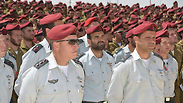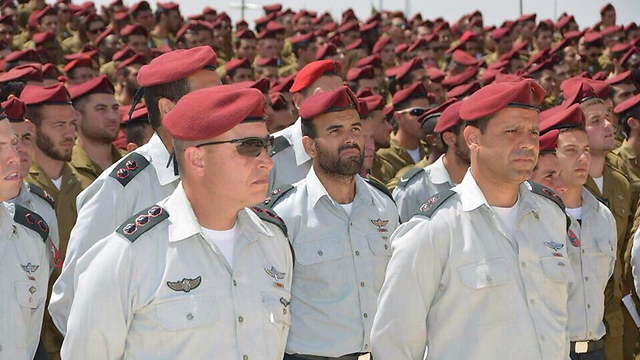
Redefining Israel’s national security
Op-ed: Israel is currently in the midst of an international public opinion war: Instead of trying to “orchestrate” organizations and enthusiastic individuals to engage in hasbara, Israel should recruit the IDF to this battlefield in order to face this great national challenge.
Israel is currently in the midst of an international public opinion war. Instead of trying to “orchestrate” organizations and enthusiastic individuals with good will who try to influence international public opinion regarding Israel’s policies and actions (aka hasbara), Israel should recruit the IDF to this battlefield in order to face this great national challenge.
In 2009 the Palestinians changed their strategy in their struggle against Israel; they shifted from a strategy of assuming that negotiations with Israel will best serve the Palestinian cause, to a new strategy that combines delegitimizing the state of Israel, along with unilateral political-diplomatic acts that are aimed at creating a legal and political “balance of terror” against Israel.
The Palestinians, in a synchronized and planned move, have created an ecosystem aimed at the dismissal of Israel’s right to exist in every possible way, inter alia by encouraging and initiating boycotts of Israel (led by the BDS movement), ostracism of Israel and by creating alternative narratives to the Israeli one.
In addition, The Palestinian Authority has acted to get recognition as a Palestinian state in a unilateral way, trying to bypass bilateral negotiations that would probably bring along some mutual concessions. At the peak of these strategic unilateral efforts, the Palestinian Authority has become an official member of the International Criminal Court and for the first time has succeeded in changing the “rules of the game” by creating a substantial deterrence platform against Israeli decision makers.
Israel, who has been focused on the Iranian nuclear threat for the last decade, did not prepare itself sufficiently to deal with the intensifying threat that was constantly growing in front of its eyes. Israeli decision makers were divided into two camps, both of whom espoused flawed strategic approaches.
One camp assumed that only formal negotiations that might eventually lead to the two state solution will ultimately defuse the new strategic threat on the state of Israel. They pushed as hard as possible towards achieving such an agreement with the Palestinians, even as the entire Middle East and its old state structures have deteriorated and vanished and even when the chances of reaching such an agreement faded in the Middle East’s ever-growing chaos.
The other camp found it difficult to let go of their old paradigms and kept defining Israeli national security in old terms and definitions that originated from the challenges of the 20th century, mainly focused on weapons and fire systems. These Israeli decision makers did not update their definition of “national security” to include components of geopolitical strength, international propaganda and public relations abilities. That outdated approach created an unbalanced budget by allocating about NIS 50-60 billion to classic defense capabilities, while allocating only a mere NIS 60 million to Israeli public relations (hasbara).
In 2016, the Israeli defense ministry's budget was granted an additional NIS 6 billion, but the whole increase was blindly and automatically directed to weapon systems, the use of which is being reduced more and more, instead of being directed to an updated defense approach: NIS 3 billion to Israeli PR and NIS 3 billion to strengthen relations with the Jewish communities in the diaspora.
Not only do budgetary allocations suffer from historical blindness, but also the Israeli organizational structures are outdated and are fixate on yesterday’s challenges, along with a lack of creativity and relevance to the future. Israel is at the midst of an international public opinion war; it’s a war of attrition that threatens Israel’s national security and Israel’s strategic assets.
Instead of trying to orchestrate and synchronize dozens of separate organizations and hundreds of individuals who operate independently and out of their own good will to explain Israeli policies around the world - Israel ought to enlist the IDF to the challenging international campaign. Similar to the IDF’s elite signal intelligence (SIGINT) unit, the 8200 Unit, Israel should establish a designated unit of 2,000 soldiers (perhaps to be named Unit 8300), focused on the international public relatios war carried out in various languages and across various countries - in order to professionally and systematically explain to the entire world the broad consequences of the Middle East’s continued collapse.
Against radical Islam, we should defend ourselves not only by military means, but also by updated dynamic and multidisciplinary methods that do not stagnate. Only the IDF has the capability to run such an elaborate challenging project of this sort. Only the IDF has the ability to execute such a strategic project. The IDF has exclusive access to human resources of the relevant age for this sort of assignment and challenge.The IDF is the only organization who can pay hundreds of NIS per month to thousands of highly qualified and promising young people to work in an efficient and effective professional system. Governmental offices and even non-governmental organizations cannot recruit young people on such a large scale nor can they compete with the salaries of the private sector.
Thus the IDF will once again establish in Israel a highly professional pool of workers with an advanced technological infrastructure. The IDF will enable the private sector to develop abilities in the domain of social networks and public relations, similar to the cyber abilities that have been developed in the Israeli high-tech industry. Into this new unit and field of expertise, the IDF would be able to integrate women, ultra-Orthodox Jews and under the right management it might even attract Israeli-Arabs and thus increase the percentage of the Israeli-Arabs recruited to the IDF, another strategic and important challenge for the Israeli society and economy.
Israel should begin by applyig the answers of the future to present-day challenges, and convince its decision makers and generals that public opinion is a force to be reckoned with and that strategic defense does not only mean tanks and airplanes.











